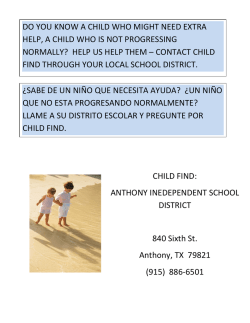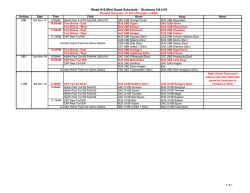
Construcción en terreno propio - Inicio
K - 6 w e e k ly B u l l e t i n Baker Elementary Schools For the week of October 13th— October 18th, 2014 Parents & Staff: Just a friendly reminder—Carbonated beverages, (soda pop, etc.), are prohibited in our cafeteria. Your child can have either milk or water to drink at our lunch room. Thanks ATTENTION PARENTS: If you need to contact a teacher or Paraprofessional please call the Elementary school office at 778-2022. Your message will be sent to the person you need to get a hold of. Calls transferred into a teacher or a Para-professional during instructional time will be for emergency situations only as determined by the elementary school secretary. All face to face meetings with teachers or Para-professionals will need to be scheduled with that person far in advance, preferably before school or after school, to eliminate any interruption to student instruction. We want to encourage all parents to take an active role in their child’s education, and will appreciate your following of these simple guidelines. Thank you! Day Breakfast/Lunch Mon Cheerios, fruit, yogurt 13th Pepperoni Pizza Tue Cereal Bars, fruit, yogurt 14th Sub Sandwiches Wed Toast, fruit, yogurt 15th Chicken Strips Thur NO SCHOOL 16th Fri NO SCHOOL 17th Mark Your Calendars October 16th—17th Also…. Parents who have their children walking or riding their bikes afterschool from Lincoln to Longfellow need to emphasize with your child the importance of bike and pedestrian safety. We are getting some reports of unsafe behavior and do not want an accident to occur. We will speak with the kids to remind them of the safe way to travel home from school. Please be “extra-observant” when picking up your child, little people are often hard to see, take your time, use extreme caution, Thanks! Activities this week NO School Teacher’s Convention Days November 2nd Daylight Savings Time Set Clocks BACK 1 hour November 4th Parent-Teacher Conferences Early Out at 2:14 Conferences 3:00 - 8:00 PM November 26th Early Out 1:30 for Thanksgiving break! 6 day Weather forecast... RP 32:2 Effective and Appropriate Help With Homework Parenting requires many judgment calls, including numerous decisions related to schoolwork and school projects. Principals and teachers are always stressing how important it is for parents to be involved, but how much is too much? For a start, put yourself in these situations: • • • Your child’s big science project is due tomorrow, but her after-school schedule has been so busy lately that she hasn’t had time to finish it herself. Not wanting her to get a bad grade, you end up doing most of the work with her so she can turn it in on time. Your son’s math homework packet is a big part of his grade, but he’s having trouble with a few of the concepts. Is it OK to help him with some of the answers? Your daughter must write a poem for a school competition, but the verses she’s come up with so far seem pretty bad. After thinking about her theme, you suggest different rhyming phrases that sound better. When the awards are announced, your daughter comes home excited and says, “We won!” We all want our children to do well in school. But, sometimes, we might want it too much and end up giving them too much assistance. The problem is, while their grades might look stellar, their self-esteem can suffer. Children are smarter than we sometimes give them credit for. They know when they’ve earned a grade—and when they haven’t. Instead of helping them succeed, too much parental involvement can lead them to failure. So what’s a concerned parent to do? How much help is reasonable? What kinds of suggestions or assistance are acceptable? And what do you do if they don’t understand their homework, even after asking you for guidance? Don’t do it for them. Rule No. 1 is an easy one to remember: Don’t ever do your children’s homework or school projects for them. The assignments were given to them for a reason—they need to learn the concepts, and they can’t do that learning if you do their work. Guidance is great. Help your children understand assignments by talking with them about the concepts. Let’s say your child is having trouble with basic division. Dump out a stack of pennies or paper clips, count the total, and, together, divide them into groups of five, six, or seven. If your child has writer’s block, instead of suggesting phrases to use, brainstorm together about ideas of things he or she could write about, and ask your child to list some of the things he or she could say. Help your children to learn how to think through the process. Be encouraging. It can be frustrating to try to master new concepts and complete school projects. Give your children encouragement and understanding as they work things through. Expand their brains. One great way parents can help their children with school projects is by asking them to go beyond their original ideas. If your son, for example, wants to do a shoebox diorama about dinosaurs, tell him that his original idea is good, but ask what other ways he could try. Don’t give him ideas, but help him use his own creativity. Ask him to think out a number of different ways he could approach the assignment. Let him follow his own path, and both you and his teacher will probably be very pleased with the result. Not only that, the work will be his own. Finally, know when to call for help. If your child is consistently having trouble with a specific concept, even after you’ve helped explain it to him or her, it’s time to let the teacher know. Chances are yours isn’t the only child in the class who’s confused. In addition to learning the schoolwork, your child will gain some very important knowledge: that it’s smart to ask for help when you don’t understand something. Report to Parents, written to serve elementary and middle-level principals, may be reproduced by National Association of Elementary School Principals members without permission. Current year back issues are available to members at www.naesp.org. RP 32:2 Cómo ayudar a sus niños con las tareas escolares de una manera efectiva y apropiada Los padres deben ejercer buen juicio y tomar muchas decisiones, incluyendo aquellas que traten con los deberes y proyectos escolares. Aunque los directores escolares y maestros siempre enfatizan la importancia de la participación de los padres en la educación de sus niños, ¿cómo se pueden determinar los limites de esa ayuda? Para comenzar, póngase en las siguientes situaciones: • • • Su niña debe entregar el proyecto de ciencias mañana, pero el horario extraescolar no le ha permitido terminarlo sola. Para que lo pueda entregar a tiempo y no saque mala nota, usted le ayuda y hace la mayor parte del trabajo. Las tareas de matemáticas forman gran parte de las notas de su hijo, pero le cuesta comprender algunos de los conceptos. ¿Es aceptable ayudarle con las respuestas? Su hija debe escribir un poema para un concurso escolar, pero no ha podido escribir versos buenos. Después de pensarlo, usted le hace algunas sugerencias que riman y suenan mejor. Cuando anuncian los resultados del concurso, su hija llega a casa y dice, “¡Ganamos!” Todos queremos que nuestros niños rindan bien académicamente. Pero a veces lo deseamos tanto que les ayudamos demasiado. El problema es que aunque sus notas se vean muy bien, el autoestima de sus niños puede sufrir. Los niños son más inteligentes de lo que nosotros creemos, y saben cuando se merecen una nota. En lugar de ayudarles a lograr el éxito, un exceso de participación por parte de los padres puede resultar en todo lo contrario. Entonces, ¿qué debe hacer un padre preocupado por el rendimiento académico de sus niños? ¿Cuánta ayuda es razonable? ¿Qué tipo de sugerencias o ayuda es aceptable? ¿Qué debe hacer si sus niños no comprenden las tareas, aun después de haberle pedido su ayuda? No hacerles las tareas escolares. La Regla No. 1 es fácil de recordar: Nunca haga las tareas o proyectos de sus niños. Las asignaciones tienen un propósito—ellos necesitan aprenderse los conceptos, y no van a prender nada si usted hace las tareas en lugar de ellos. Cómo guiarles. Ayúdeles a comprender las asignaciones por medio conversar acerca de los conceptos. Digamos que su niño tiene problemas con la división. Usando monedas o sujetapapeles, cuenten el total y juntos, divídanlos en grupos de cinco, seis o siete. Si su niño esta teniendo problemas en escribir, haga algunas sugerencias en cuanto a frases y juntos conversen acerca de algunas ideas de temas sobre los cuales puede escribir, o pídale a su niño que haga una lista de ideas. Ayude a sus niños para que puedan pensar cómo completar el proceso. Anímelos. El tratar de dominar conceptos nuevos y completar proyectos escolares puede resultar frustrante para sus niños, así es que trate de animarlos y comprender mientras ellos resuelven las cosas. Ayúdeles a desarrollar el cerebro. Una excelente manera de ayudarles con los proyectos escolares es por medio de pedirles que vayan más allá de sus ideas originales. Por ejemplo, si su hijo quiere hacer un diorama sobre los dinosaurios con una caja de zapatos, dígale que su idea es excelente pero pregúntele en qué otras maneras puede hacerlo. En lugar de darle ideas, ayúdele a usar su creatividad. Pídale que trate de pensar en diferentes maneras de completar la asignación. Deje que siga su propio camino, y tanto usted como la maestra estarán contentas con el resultado, y además, el trabajo será el suyo. Finalmente, sepa cuando pedir ayuda. Si su niño tiene problemas con un concepto de una manera consistente, aun después de que usted se lo haya explicado, debe avisarle al maestro. Es muy posible que no sea el único niño en la clase que este confundido. Además de aprenderse las tareas, su niño aprenderá algo muy importante: es un signo de inteligencia pedir ayuda cuando no se comprende algo. Este Informe a Los Padres fue escrito para los directores escolares. Los miembros de la Asociación Nacional de Directores de Escuelas Primarias (NAESP) pueden reproducirlo sin permiso. Las últimas ediciones de este año están accesibles en la sección de los miembros en www.naesp.org.
© Copyright 2026

